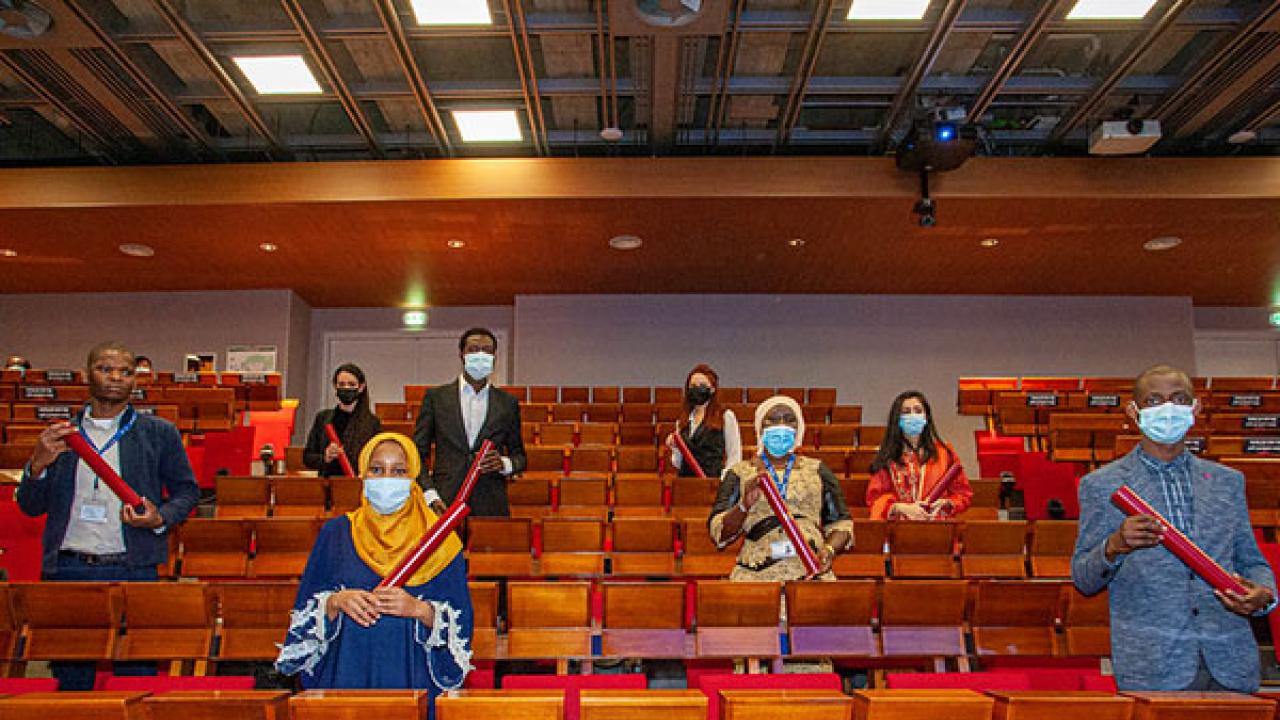
Eight students from eight developing countries became the latest to receive a Master of Advanced Studies in Medical Physics (MMP) at a hybrid ceremony held 26 January at ICTP.
A recording of the ceremony is available on ICTP's YouTube channel.
The students had completed ICTP's two-year study and clinical training programme, in spite of the hardships brought on by the pandemic, which struck just as the students were set to begin their hands-on experience in hospitals.
With their new degrees, they are now part of a growing community of well-trained professional medical physicists, filling a dire need for such professionals throughout the developing world. Since the programme began in 2014, 146 students from 63 countries have graduated.
The students have spent the last two years enrolled in the world’s only medical physics master's programme devoted to scientists from developing countries. ICTP, with its decades of experience supporting sustainable science in less advantaged parts of the world, launched the degree programme seven years ago with academic backing from the University of Trieste. In addition, ICTP receives invaluable, ongoing support from its UN partner, the International Atomic Energy Agency (IAEA), whose experts actively participate as course lecturers and curriculum developers. The IAEA also provides fellowships to many of the students.
"I know that this year has been very difficult, and I congratulate you. I think it's a big achievement to live through this, and persist and complete the course. You should be doubly proud that you have done it," said ICTP Director Atish Dabholkar in remarks at the ceremony, which was held in-person and online.
Addressing the MMP students at the ceremony, IAEA Director General Rafael Mariano Grossi said in pre-recorded remarks, "The world needs your talents; now is the time to give back. Too many people are dying of preventable and treatable cancers. I urge you to seek not only to heal people but also to heal their communities. My advice for you is to keep learning, and do something that is good for others."
The graduates praised the quality of the MMP programme. "It has the ideal balance between knowledge, quality of teaching, humanity and ethics (among many other qualities)," said Rosa Petit Sevilla, from Venezuela. She added, "These characteristics make this programme unique in the world; in short, they make studying a delight. It undoubtedly will help me in my career; the knowledge acquired at the academic, professional and human level is invaluable."
Graduate Erick Kapis of Kenya appreciated the clinical training that the programme offers in the second year of study. "This is important, because it gives the resident the opportunity to not only apply, but also experience the workings of physics principles learned in the first year on various medical physics techniques," he explained.
That clinical training had only just begun when the Covid pandemic struck, but the students carried on as best as they could, with the help and support of ICTP faculty. "The pandemic personally put me in difficulties to be more concentrated on the training, at the beginning. But with the assistance of [ICTP faculty members] Professors Padovani and Longo, we were able to overcome the stress due to the pandemic," said Tape Achille Kore, a student from Côte d'Ivoire.
Erick Kapis had a more philosophical take on the pandemic's effect. "Major global events like the world cup, Olympic games or natural disasters like tsunami bring humanity together, but not to the scale of the COVID-19 pandemic," he said, adding, "Our challenges as medical workers became similar across the globe. In fact, in my particular case, I can say being consistent with the World Health Organization protocols and observing the local Ministry of Health recommendations helped me a lot during the training. I would say personal care in a global pandemic is key."
Other MMP graduates expressed their appreciation of the two-year programme they have now completed. "In my opinion, the MMP programme will help me embark on a new career as an international medical physicist and is the key to unlocking the door to a better future," said Khady Sy, of Senegal. Her classmate, Penabei Samafou of Chad, had a similar view: "The MMP programme will undoubtedly help me face a better future and be recognized as a medical physicist internationally," he said.
Tanzanian student Rehema Ramadhan reflected on her time in Trieste: "The MMP programme, and ICTP in general, has given us an unforgettable life experience. Through this programme we have been able to acquire new academic qualifications as well as building a network with scientists from different parts of the world. Despite the challenges we faced during the pandemic, ICTP, the University of Trieste and the hospitals have been always with us."
In addition to backing from the IAEA, the MMP programme receives strong support from the International Organisation for Medical Physics (IOMP) and the European Federation of Organizations in Medical Physics (EFOMP), in collaboration with Trieste hospitals. The Master’s Programme has been accredited by the International Organisation for Medical Physics (IOMP).
Photos of the graduation ceremony are available on ICTP's Flickr account.
















